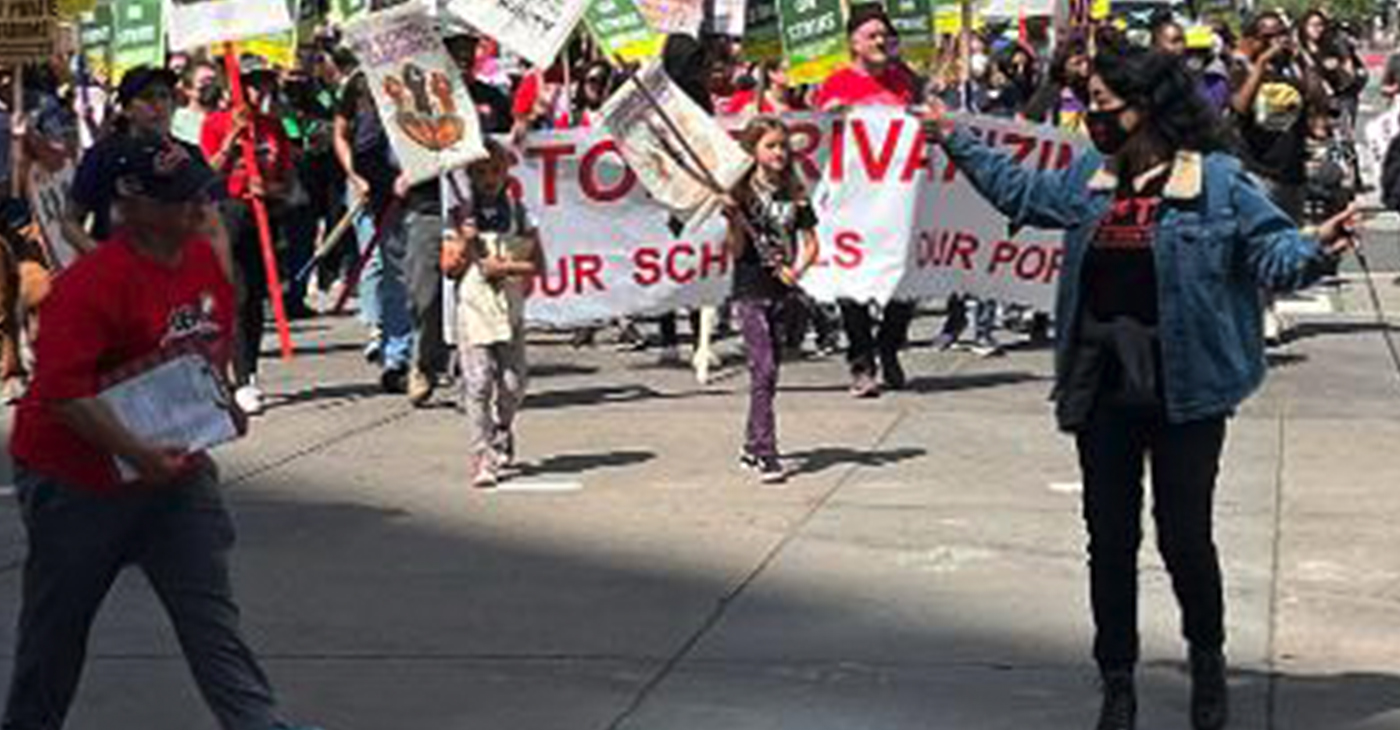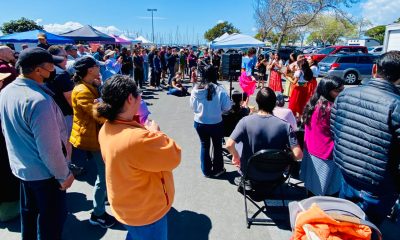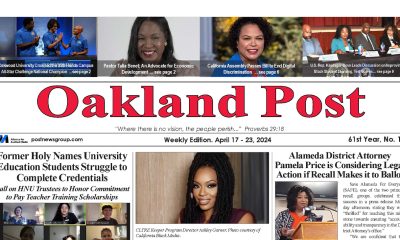Activism
“Whose City? Our City!” – Teachers and Port Workers Strike to Stop Corporate Privatizers
At the heart of the protests were united actions of the Oakland Education Association (OEA) and the International Longshore and Warehouse Union (ILWU) Local 10. The strikes, as well as rallies and a march, were proposed by a new coalition, Schools and Labor Against Privatization (S.L.A.P.), composed of rank-and-file educators, members and leaders of the ILWU and community members opposed to the privatization of public assets and the accelerated displacement of Oakland’s Black, Latino and working-class residents.

By Ken Epstein
In a show of growing strength, Oakland teachers and longshore workers held simultaneous one-day strikes and rallies together on April 29 to stop billionaires and corporations, backed by elected Democrats, who seek to gentrify the city by closing as many as half of Oakland’s public schools and giving away public funds and public land to build a $12-billion luxury real estate project and baseball stadium at the Port.
At the heart of the protests were united actions of the Oakland Education Association (OEA) and the International Longshore and Warehouse Union (ILWU) Local 10. The strikes, as well as rallies and a march, were proposed by a new coalition, Schools and Labor Against Privatization (S.L.A.P.), composed of rank-and-file educators, members and leaders of the ILWU and community members opposed to the privatization of public assets and the accelerated displacement of Oakland’s Black, Latino and working-class residents.
The OEA called the one-day Unfair Labor Practices strike to protest the district’s unilateral decision to close schools this year and next year without consulting the affected school communities.
The union says this violates a 2019 strike settlement agreement. Seventy-five percent of voting members voted in favor of the strike, and 94% of union members honored the picket lines. Trying to have the strike declared “illegal,” the school district asked the California Public Employment Relations Board (PERB) for an injunction, but the request was denied. The district asked families to keep their children home from school that Friday.
The ILWU shut down the Port of Oakland’s day shift that Friday with a stop-work meeting, which is allowed under the union contract. Later in the afternoon, community members at Port terminals shut down the night shift as longshore workers refused to cross picket lines.
OEA President Keith Brown told the Oakland Post, “The reason why educators were forced to take this action is because the Oakland Unified School District must honor their agreements – there must be engagement with family and community before taking any actions to close schools. The actions of the majority of the school board have been very disrespectful to parents and the community. We are encouraged by the powerful support for the one-day strike. But it’s only the beginning of the movement to fund our schools and save our schools from closure.”
OEA representatives voted at a union meeting this week to “stand in solidarity with ILWU Local 10 and to support their fight to save the Port of Oakland. It’s a continuation of the longtime solidarity between educators of Oakland and longshore workers,” Brown said.
“There’s been tremendous support from parents, community and labor in this fight to save our schools, shown by numbers coming out for rallies,” Brown continued. “We need to continue to build from that momentum, to reach out to the faith community and others to organize and educate. We need to work in the November elections to elect school board members who will work with parents and stakeholders, not run from the community and not hide from the community, not close our neighborhood schools.”
Trent Willis, immediate past president of ILWU Local 10 and a leader of S.L.A.P., said the fight to stop privatization of the Port of Oakland is a survival issue for longshore workers.
“We have no choice but to oppose the stadium. We’re fighting for our lives,” he said. With only $1 billion of the $12 billion Howard Terminal project designated to build the stadium, Willis said, “This is a real estate deal masquerading as a stadium project. It’s a slick gimmick. Just having the stadium there would be a nightmare for cargo, pedestrians, the rails, transportation. The costs (to the public) would be astronomical to make it safe for people to travel through that area.”
He said he liked Councilmember Carroll Fife’s proposal for allowing Oakland voters to decide whether they want to use public funds to build the Port project. People in Oakland “don’t want to spend public money on building the stadium.”
Strike actions began early Friday morning with OEA members picketing at school sites throughout the city. Teachers were joined on the picket lines by students and families as well as community members and school workers in AFSCME and SEIU 1021.
At a mid-day event, hundreds of teachers and supporters held a “Save Our Schools” block party at Lake Merritt with interactive activities and warm solidarity, along with a lot of education on how school closures and privatization negatively impact Black students and other students of color.
A joint rally of teachers, port workers and community members took place at 2:00 p.m. in Oscar Grant Plaza in front of Oakland City Hall, followed by a short march down Broadway to rally in front of the school district headquarters at 1000 Broadway. At 4:30 p.m., members of the community went to the Port to shut down work on the night shift.
An election forum sponsored by S.L.A.P. on Saturday asked candidates for mayor, board of supervisors and county superintendent of schools where they stood on the issues of school closings and privatization of the Port.
Activism
Oakland Post: Week of April 17 – 23, 2024
The printed Weekly Edition of the Oakland Post: Week of April 17 – 23, 2024

To enlarge your view of this issue, use the slider, magnifying glass icon or full page icon in the lower right corner of the browser window. ![]()
Activism
Oakland Schools Honor Fred Korematsu Day of Civil Liberties
Every Jan. 30, OUSD commemorates the legacy of Fred Korematsu, an Oakland native, a Castlemont High School graduate, and a national symbol of resistance, resilience, and justice. His defiant stand against racial injustice and his unwavering commitment to civil rights continue to inspire the local community and the nation. Tuesday was “Fred Korematsu Day of Civil Liberties and the Constitution” in the state of California and a growing number of states across the country.

By Post Staff
Every Jan. 30, OUSD commemorates the legacy of Fred Korematsu, an Oakland native, a Castlemont High School graduate, and a national symbol of resistance, resilience, and justice.
His defiant stand against racial injustice and his unwavering commitment to civil rights continue to inspire the local community and the nation. Tuesday was “Fred Korematsu Day of Civil Liberties and the Constitution” in the state of California and a growing number of states across the country.
One OUSD school is named in his honor: Fred T. Korematsu Discovery Academy (KDA) elementary in East Oakland.
Several years ago, founding KDA Principal Charles Wilson, in a video interview with anti-hate organization “Not In Our Town,” said, “We chose the name Fred Korematsu because we really felt like the attributes that he showed in his work are things that the children need to learn … that common people can stand up and make differences in a large number of people’s lives.”
Fred Korematsu was born in Oakland on Jan. 30, 1919. His parents ran a floral nursery business, and his upbringing in Oakland shaped his worldview. His belief in the importance of standing up for your rights and the rights of others, regardless of race or background, was the foundation for his activism against racial prejudice and for the rights of Japanese Americans during World War II.
At the start of the war, Korematsu was turned away from enlisting in the National Guard and the Coast Guard because of his race. He trained as a welder, working at the docks in Oakland, but was fired after the bombing of Pearl Harbor in 1941. Fear and prejudice led to federal Executive Order 9066, which forced more than 120,000 Japanese Americans out of their homes and neighborhoods and into remote internment camps.
The 23-year-old Korematsu resisted the order. He underwent cosmetic surgery and assumed a false identity, choosing freedom over unjust imprisonment. His later arrest and conviction sparked a legal battle that would challenge the foundation of civil liberties in America.
Korematsu’s fight culminated in the Supreme Court’s initial ruling against him in 1944. He spent years in a Utah internment camp with his family, followed by time living in Salt Lake City where he was dogged by racism.
In 1976, President Gerald Ford overturned Executive Order 9066. Seven years later, the 9th Circuit Court of Appeals in San Francisco vacated Korematsu’s conviction. He said in court, “I would like to see the government admit that they were wrong and do something about it so this will never happen again to any American citizen of any race, creed, or color.”
Korematsu’s dedication and determination established him as a national icon of civil rights and social justice. He advocated for justice with Rosa Parks. In 1998, President Bill Clinton gave him the Presidential Medal of Freedom saying, “In the long history of our country’s constant search for justice, some names of ordinary citizens stand for millions of souls … To that distinguished list, today we add the name of Fred Korematsu.”
After Sept. 11, 2001, Korematsu spoke out against hatred and discrimination, saying what happened to Japanese Americans should not happen to people of Middle Eastern descent.
Korematsu’s roots in Oakland and his education in OUSD are a source of great pride for the city, according to the school district. His most famous quote, which is on the Korematsu elementary school mural, is as relevant now as ever, “If you have the feeling that something is wrong, don’t be afraid to speak up.”
Activism
WOMEN IMPACTING THE CHURCH AND COMMUNITY
Juanita Matthews, better known as “Sister Teacher,” is a walking Bible scholar. She moved to California from the great state of Arkansas in 1971. Sister Teacher has a passion for teaching. She has been a member of Bible Fellowship Missionary Baptist Church since 1971.

Sister Juanita Matthews
55 Years with Oakland Public School District
The Teacher, Mother, Community Outreach Champion, And Child of God
Juanita Matthews, better known as “Sister Teacher,” is a walking Bible scholar. She moved to California from the great state of Arkansas in 1971. Sister Teacher has a passion for teaching. She has been a member of Bible Fellowship Missionary Baptist Church since 1971. She followed her passion for teaching, and in 1977 became the lead teacher for Adult Class #6. Her motto still today is “Once My Student, Always My Student”.
Beyond her remarkable love for the Lord, Sister Teacher has showcased her love for teaching by working for the Oakland Unified School District for 55 years, all but four of those years spent at Emerson Elementary and Child Development School. She truly cares about her students, making sure they have the tools/supplies needed to learn either at OUSD or Bible Fellowship Missionary Baptist Church.
She’s also had a “Clothes Closet Ministry” for 51 years, making sure her students have sufficient clothing for school. The Clothes Closet Ministry extends past her students, she has been clothing the community for over 50 years as well. She loves the Lord and is a servant on a mission. She is a loving mother to two beautiful children, Sandra and Andre. This is the impact this woman of God has on her church and the community.
-

 Activism4 weeks ago
Activism4 weeks agoOakland Post: Week of March 27 – April 2, 2024
-

 #NNPA BlackPress4 weeks ago
#NNPA BlackPress4 weeks agoCOMMENTARY: D.C. Crime Bill Fails to Address Root Causes of Violence and Incarceration
-

 #NNPA BlackPress4 weeks ago
#NNPA BlackPress4 weeks agoMayor, City Council President React to May 31 Closing of Birmingham-Southern College
-

 #NNPA BlackPress4 weeks ago
#NNPA BlackPress4 weeks agoBeloved Actor and Activist Louis Cameron Gossett Jr. Dies at 87
-

 Community1 week ago
Community1 week agoFinancial Assistance Bill for Descendants of Enslaved Persons to Help Them Purchase, Own, or Maintain a Home
-

 Activism3 weeks ago
Activism3 weeks agoOakland Post: Week of April 3 – 6, 2024
-

 Business1 week ago
Business1 week agoV.P. Kamala Harris: Americans With Criminal Records Will Soon Be Eligible for SBA Loans
-

 Activism2 weeks ago
Activism2 weeks agoOakland Post: Week of April 10 – 16, 2024

















































